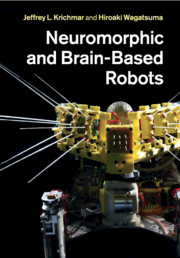Book contents
- Frontmatter
- Contents
- Contributors
- Preface
- Part I Introduction
- Part II Neuromorphic robots: biologically and neurally inspired designs
- Part III Brain-based robots: architectures and approaches
- Part IV Philosophical and theoretical considerations
- 10 From hardware and software to kernels and envelopes: a concept shift for robotics, developmental psychology, and brain sciences
- 11 Can cognitive developmental robotics cause a paradigm shift?
- 12 A look at the hidden side of situated cognition: a robotic study of brain-oscillation-based dynamics of instantaneous, episodic, and conscious memories
- 13 The case for using brain-based devices to study consciousness
- Part V Ethical considerations
- Index
- References
11 - Can cognitive developmental robotics cause a paradigm shift?
from Part IV - Philosophical and theoretical considerations
Published online by Cambridge University Press: 05 February 2012
- Frontmatter
- Contents
- Contributors
- Preface
- Part I Introduction
- Part II Neuromorphic robots: biologically and neurally inspired designs
- Part III Brain-based robots: architectures and approaches
- Part IV Philosophical and theoretical considerations
- 10 From hardware and software to kernels and envelopes: a concept shift for robotics, developmental psychology, and brain sciences
- 11 Can cognitive developmental robotics cause a paradigm shift?
- 12 A look at the hidden side of situated cognition: a robotic study of brain-oscillation-based dynamics of instantaneous, episodic, and conscious memories
- 13 The case for using brain-based devices to study consciousness
- Part V Ethical considerations
- Index
- References
Summary
Introduction
This chapter discusses how cognitive developmental robotics (CDR) can make a paradigm shift in science and technology. A synthetic approach is revisited as a candidate for the paradigm shift, and CDR is reviewed from this viewpoint. A transdisciplinary approach appears to be a necessary condition and how to represent and design “subjectivity” seems to be an essential issue.
It is no wonder that new scientific findings are dependent on the most advanced technologies. A typical example is brain-imaging technologies such as fMRI, PET, EEG, NIRS, and so on that have been developed to expand the observations of neural activities from static local images to ones that can show dynamic and global behavior, and have therefore been revealing new mysteries of brain functionality. Such advanced technologies are presumed to be mere supporting tools for biological analysis, but is there any possibility that it could be a means for new science invention?
Information
- Type
- Chapter
- Information
- Neuromorphic and Brain-Based Robots , pp. 251 - 273Publisher: Cambridge University PressPrint publication year: 2011
References
Accessibility standard: Unknown
Why this information is here
This section outlines the accessibility features of this content - including support for screen readers, full keyboard navigation and high-contrast display options. This may not be relevant for you.Accessibility Information
- 8
- Cited by
